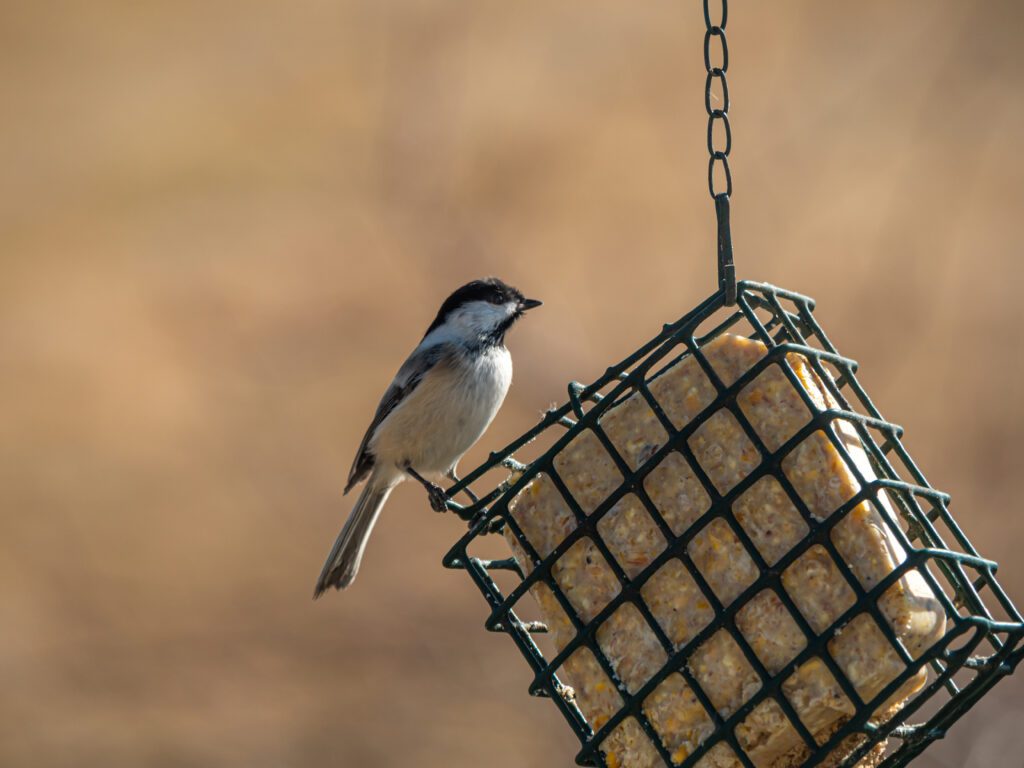January 15, 2025
Welcoming the Chickadees: A Winter Garden’s Friendliest Visitor
If there’s one bird that seems to embody the charm and resilience of a New England winter, it’s the black-capped chickadee. Known for their cheerful “chick-a-dee-dee-dee” call and striking black-and-white head pattern, these little birds are a delight to watch. As Massachusetts’ state bird, the black-capped chickadee is a familiar and friendly visitor to backyards year-round, but winter is when they truly shine.
Whether you’re a seasoned birdwatcher or just getting started, learning how to attract and support chickadees is a wonderful way to connect with nature during the colder months. Let’s explore what makes these birds so special, how to provide for them during winter, and how your garden can welcome them all year long.

What Do Chickadees Eat in Winter?
Winter in Massachusetts is tough, but chickadees are tougher. These small birds are well-adapted to the cold, fluffing up their feathers to stay warm and caching food to survive the leaner months. To help chickadees thrive in your yard, offering the right food is essential:
- Black-Oil Sunflower Seeds: A favorite among these little guys, these seeds are high in fat and easy for them to crack open. Opt for a feeder that accommodates small birds to ensure chickadees can feed comfortably.
- Suet: Packed with energy, suet is an excellent winter food. Suet feeders with cages work well to keep larger birds or squirrels from hogging it all.
- Peanuts (Shelled or Crushed): Chickadees love peanuts! They’re a great source of protein and fat during the winter months.
- Mealworms: Though typically associated with spring, dried mealworms can provide a nutritious boost especially when mixed with seeds.
Providing a mix of these options in your feeders will ensure chickadees visit often—and bring a little cheer to even the grayest winter day.
The Perfect Habitat for Chickadees
While chickadees will visit feeders, they also rely on natural food sources and shelter. By creating a welcoming habitat in your garden, you can make your yard a haven for these birds year-round.
- Trees and Shrubs for Food:
- Birches and Alders: These native trees produce small seeds that chickadees enjoy. If you already have them in your yard, great! If not, consider planting them for long-term support.
- Sumac and Elderberry: Shrubs like these provide berries that chickadees love in the fall and early winter. They’re also beautiful additions to your garden.
- Shelter from the Elements:
- Chickadees roost in dense shrubs, tree cavities, or even roosting boxes during the winter. Evergreens like white pine or spruce offer excellent cover from wind and snow.
- Leaving brush piles in a quiet corner of your yard can also give chickadees a safe place to rest.
- Spring and Summer Support:
- In warmer months, chickadees eat insects, including caterpillars and spiders. To attract these natural food sources, avoid using pesticides and consider planting native perennials that host beneficial insects, like milkweed or goldenrod.
Fun Facts
- Chickadees have an incredible memory! They can remember the locations of hundreds of food caches they’ve created during the winter.
- Despite their tiny size (weighing less than half an ounce), chickadees are hardy birds that can survive temperatures as low as -40°F.
- Their famous “chick-a-dee-dee-dee” call is not just cheerful—it’s also a form of communication. The number of “dee” notes increases to signal danger.
How to Enjoy Chickadees This Winter
Watching chickadees flit around your feeders or hop along tree branches is one of the simple joys of winter birding. Here are a few tips to make the experience even better:
- Place Feeders Near Cover: Chickadees feel safer feeding near shrubs or trees where they can quickly retreat if a predator approaches.
- Rotate Feeder Locations: Moving feeders slightly every few weeks can prevent seed hull buildup and help keep the area clean.
- Get the Family Involved: Chickadees are curious and bold, often the first birds to discover a new feeder. Kids will love watching these feathered acrobats dart back and forth, and birdwatching can be a great family activity.
Mahoney’s Has What You Need for Chickadees
At Mahoney’s Garden Centers, we’re here to help you create the perfect setup for chickadees and other winter birds. From black-oil sunflower seeds and suet cakes to squirrel-proof feeders and native plants, we have everything you need to turn your backyard into a haven for birds this winter.
Stop by one of our 7 locations to chat with our knowledgeable staff, pick up supplies (for convenience, check out our online store!), and get tips on how to make your winter birding experience even more enjoyable. Let’s make this winter one to remember—for you and your feathered friends.

